The road for women to be ordained as presbyters was long.
Discussions started in 1932 before the Union and a report to the 1933 Conference stated that there was no reason to disqualify women to be ordained as presbyter, but it was rejected the following year. New proposals were approved in 1938, delayed by the war but rejected in 1948.
In 1959 the topic was broached again and the appointed committee was inconclusive for five years. Women’s ordination as presbyters was finally voted at Conference in 1973 and the first women to become ministers in Great Britain were ordained in 1974 at the Bristol Conference.
They were:
Anne Bradfield, Beth Bridges, Kathleen Burgess, Margaret Butler Kitty Foster, Irene Gibbs, Joy Hale, Elizabeth Hodgkiss, Mary Holliday, Marjorie Hopp, Jennifer Lunn, Marjorie Maltby, Irene Morrow, Clare Powers, Kathleen Share, Elsie Smith and Eileen Wragg.
Presidents and Vice-Presidents of Conference
Another major landmark was in 1948 when Mildred Clarissa Lewis was elected the first woman Vice-President of the Conference. Revd Kathleen Richardson was elected the first woman President of the Conference in 1992.
Find the full list of Presidents and Vice-Presidents of the Methodist Church here.
See the photo gallery created for the 40th anniversary in 2013
'Being a minister' by Revd Hilary Cooke
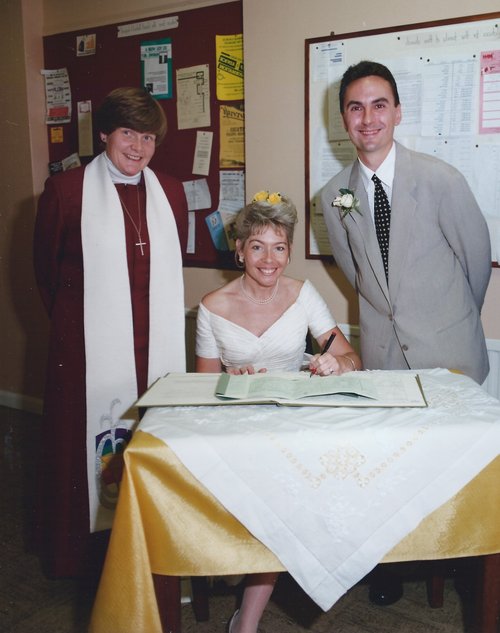
There were many fun moments. Most of mine came from having the name ‘Hilary’ as most people when seeing or hearing the name Revd Hilary Cooke automatically assumed that I was man. “The Reverend gentleman’s a lady!” one man was heard to say when he came off the phone from speaking to me the first time. I think at one of the first weddings I did, I had as many photos taken of me as the bride did.
At 21 I went into college to train as a deaconess in 1968 (two years at Handsworth and then one year at Queen’s). The year I candidated 1973/74 I was serving in South Wales – I had pastoral charge of six churches and a dispensation to administer communion – the candidating process was not easy. I had recently trained with those who were ministers and I was in a ministerial post – they didn’t really know what to do with me. They then decided that because I was under 30 and didn’t have a degree I needed to do another year in college. When I got to Manchester (The Northern Baptist college) again they didn’t know what to do with me.
When I was stationed in 1975 I was told that I would be serving as a probationer in the Swindon circuit – there was a comment that there was a doubt about whether Swindon would get a probationer so when I was told that I wasn’t going to Swindon but to the Kingswood circuit in Bristol I didn’t question it. I then learnt, much later that I didn’t go to Swindon because the Superintendent (who wasn’t even going to be there when I got there) didn’t want a woman. Ten years later I was in the Swindon circuit – God has a sense of humour!
Most of it was positive and exciting and I thoroughly enjoyed the process of putting women’s ministry on the map, but there were some difficult times. I knew there were those who stopped coming to church, or who wouldn’t take communion from me, but the worst was an underlying lack of respect and not being taken seriously. I went to visit a couple in one of my churches and I had barely got through the door into their kitchen where I stood as they told me everything they thought was wrong with me. I reflected later that I don’t think they would have done that had I been a man.
The stationing process could be difficult in the days when you had to wait for a circuit steward to ring, as if you were a youngish, single woman you were not high on their priority list. I waited two months without the phone ringing at all (my successor had already been chosen and appointed) and I was only offered the Swindon appointment in 1985 because as an ecumenical one it was advertised in the Recorder and I applied for it.
Throughout my ministry I have always worked closely with my local Anglican colleagues – several of my appointments have been in Anglican/Methodist LEPs – and I like to think that I played a tiny role in helping the Anglicans to value the ministry of women. When I went to Swindon I went to serve in the Dorcan Church – an LEP with three joint churches serving a large housing estate on the east of Swindon. I was there full time sharing the ministry with the Anglican vicar and in one of the churches I was effectively their vicar – the Archdeacon of Swindon used to call me ‘his Methodist Team Vicar’. There were a group of Anglican ladies who were at first very unhappy about ‘their vicar being a Methodist woman’. I have to say I take some pride in the fact that they became my greatest fans and would tell anyone who would listen the value of woman ministers.
This is not about the ordination of women, it happened before, but I have often reflected that it said something about the place of women in ministry. I entered the deaconess order in 1968 and I was one of four students that year who were the first ones to do their training in Birmingham with the men training to be ministers. We were told that we couldn’t learn Greek with the men because we wouldn’t be able to keep up with them. We were also told that we couldn’t do Philosophy because it would be too difficult for us. Two of us rebelled and joined the philosophy class and one of us (not me) was in fact the brightest in the class.
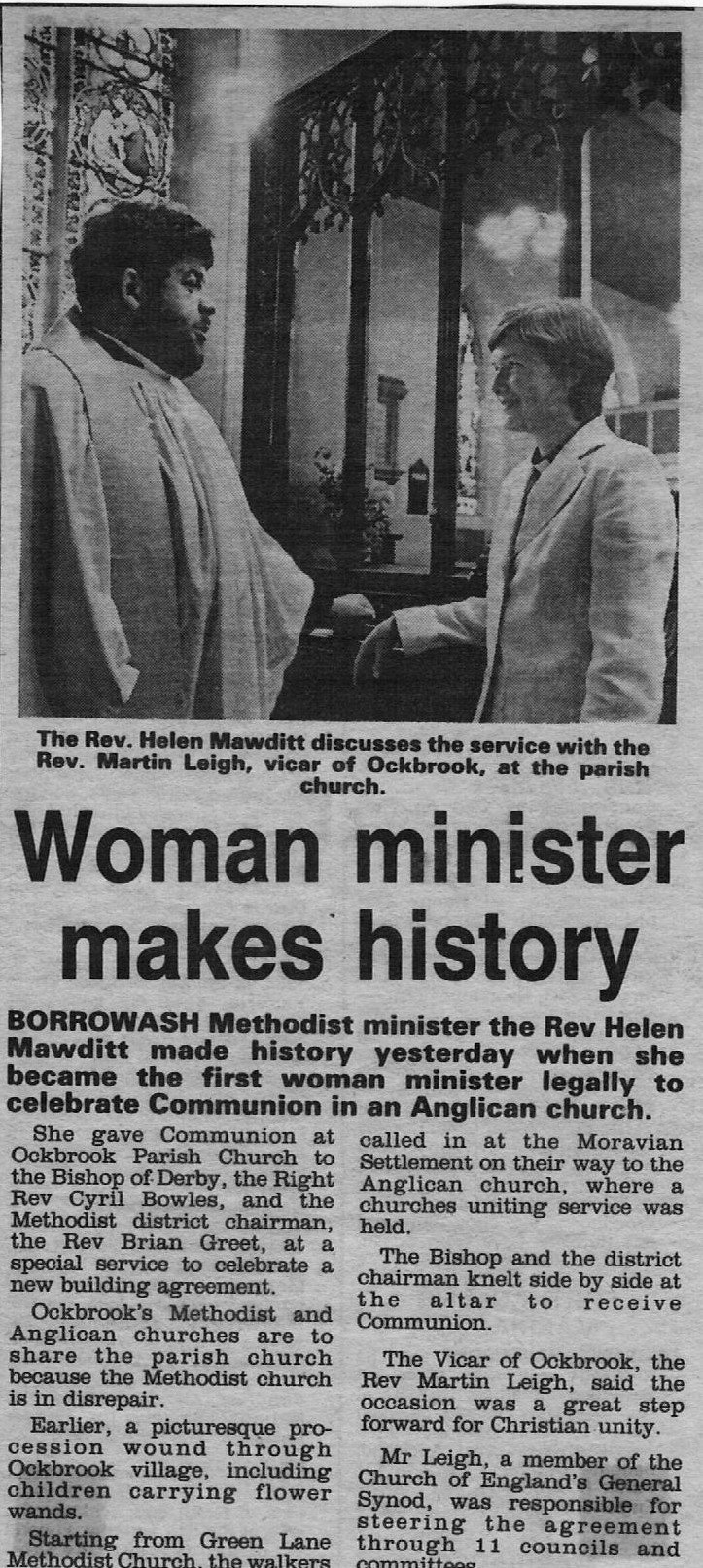
'Being a minister' by Revd Caroline Weaver
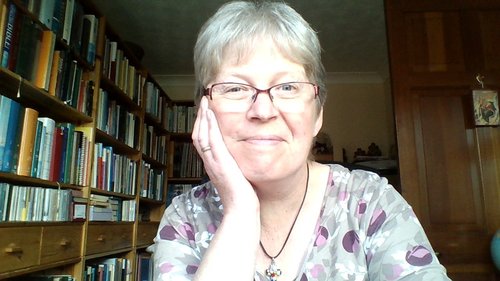
I regularly get envelopes addressed to Revd Caroline Weaver. Occasionally they contain a letter that begins Dear Mr Weaver. It’s startling that after all these years the assumption is I must be a man!
Growing up I only knew ministers who were men. They were gracious, kind and often funny, yet also tended to tell people what to believe, think and do. When I realised God was calling me to ordained ministry I wasn’t sure the model of ministry was for me but by then I had known a few women ministers too!
Unlike many of my colleagues, I have never felt especially discriminated against for being a woman in ministry other than the man who lived opposite a manse I moved into who came to say hello expecting me to be the wife of the minister. He was not impressed to find I was the minister and got very cross. I thought of him as Mr Grumpy and, for the next seven years always called out and waved cheerfully whenever I saw him. There have, of course, been people who have avoided me, criticised me and occasionally tried to undermine me. I’ve always felt that was not so much because I am a woman but because they didn’t like the way I ministered and, at least once, didn’t like the fact I was a Methodist.
In my experience so many, especially those on the margins or outside the church, have been intrigued, fascinated and then delighted at finding a woman in ministry. Working as a chaplain in the prison service so many of the residents, of whatever faith or none, were accepting, affirming and appreciative, glad to have someone who would spend time with them. listen, pray, and offer communion. But I was once asked by a Roman Catholic man should we call you father? ‘No, and I’m not your mother either although sometimes I feel like it!’
Early in my ministry, I was invited to the Women Ministers Annual Gathering. I am so very thankful for the many friends and colleagues in that gathering over many years who have given me a different model of ministry from the one I inherited. There were stories, pictures, colour, drama, symbolic actions, everyday objects somehow forming a deeply meaningful focus for worship, conversations and questions where people waited for an answer which wasn’t Jesus or a squirrel and were willing to explore where that led, even when it wasn’t the direction they anticipated. Here too was prayer, often with few or no words, but fervent and faithful.
Of course, I now know so many men presbyters (and deacons) who are also well able to model that different kind of ministry. But initially from the women, this is what I have been blessed with and taken to heart. When God calls you to minister – and we are all called to minister in some form or other – God calls you not despite who you are but because of who you are. Gender, age, race, colour, ability, or anything that you identify with or that defines you is who you are. God calls you because of who you are. Jesus said: "You did not choose me, but I chose you and appointed you so that you might go and bear fruit – fruit that will last" (John 15:16).
Memories about Revd Nichola Jones by Mary Scott
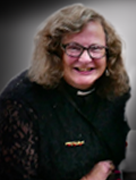
The Revd Nichola Jones has been my friend for 21 years. She came to be our Minister that year. I well remember the first time my Mother, Sister and I met her. We had been away on holiday for her first Service. When we went to Church for her second Service she was in the Worship area going around speaking to everyone. She came up to us and said “I am so sorry but I cannot remember your names”. Mother replied “that’s because you haven’t met us before!” We all laughed.
Visiting people is very important to Nichola. When my sister was due to have her first hip replacement operation Nichola was due to be away on holiday. She arranged for her Mother to telephone me to see how she was getting on. On her way home from her holiday Nichola made a detour to call in and see my sister before going to her home. I have found out over the years that she does that regularly, making sure things are all right and praying with people before going to her home.
We met her at a Church Coffee Morning on one occasion. She wanted to know where our Mom was (Mom was 100 at the time). “In hospital” was our reply. When we arrived to visit Mom three hours later, Nichola had already been to see her. Mom died a week later. Nichola could not take her funeral as she had a District MWiB Easter Offering Service the same afternoon. As soon as the Service was over she came and sat with us, and prayed.
I give these personal memories but they are representative of what she did for everyone. She goes into every school in the area, that will have her, to lead Assembly. It is common for her to know all of the local children.
She had to learn about large building projects at several of her churches. With her lovely outgoing personality, she has managed to secure large grants to get the work done.
She once said to us “I have managed to do more work for Jesus by being single than I could have done if I had married”. As single women my sister and I know what she means. However, it can not be easy being a single lady Minister. You go home to an empty house – have no one with whom you can discuss the days problems. Well, that is how it seems but Jesus is always with her and she knows that and lets you know that He is with you too.
She has had four placements since leaving our Church. My sister and I have been able to meet her halfway between us at three of them. It is usually for lunch at a Garden Centre. Well, that’s like a Royal Progress. Everyone knows her; the staff know and love her as she speaks to each of them. Sadly, her fourth placement is too far for us to meet halfway.
Her Commission from the Lord goes on though – more lonely souls for her to cheer – more congregations to encourage to continue shining the Lord’s light in their communities. More elderly to love. More school children to tell about Jesus.
I feel privileged that the Lord brought Nichola into my life and keeps her there.
I believe that women Ministers are special gifts from the Lord. I know that Nichola has enriched my life and the lives of many others too. I thank God for the women Ministers of the Methodist Church.
Being a minister by Revd Olufemi ‘Femi’s Cole-Njie
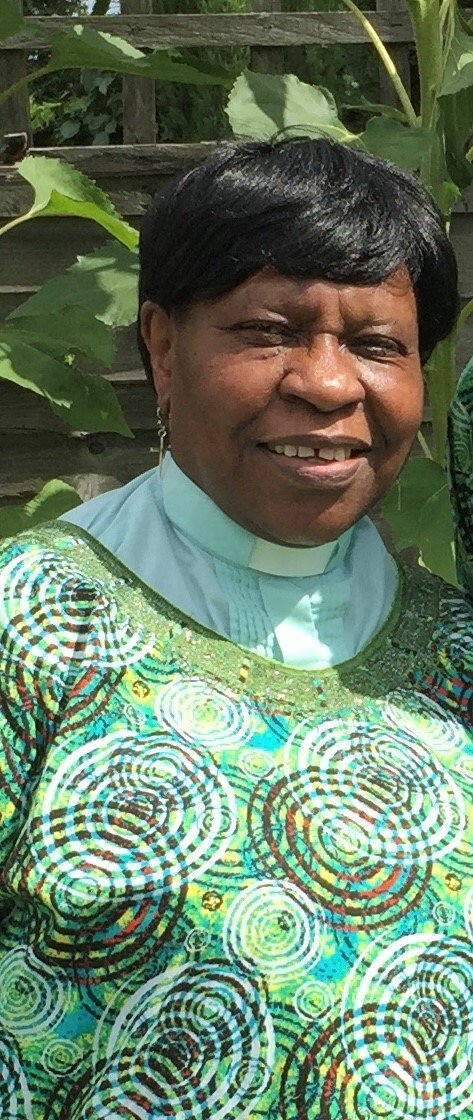
Olufemi Cole-Njie (‘Femi) hails from a family of preachers on the maternal wing of her family and is the fourth in the line of Presbyters on the paternal side. Her great uncle Revd William Thomas Cole 1 (1884-1888) and grand uncle Revd William Thomas Cole 2 (1910-1949) were among the pioneer presbyters in the Gambia Methodist Church.
‘Femi received a note to preach at the age of 18. The call to the ordained ministry of Word and Sacrament came first as a confirmation in 1979 through a former Chair of the Gambia District the late Revd Ian C. Roach. She had a few months earlier returned home to the Gambia following undergraduate studies in Home Economics Education in Ghana. Having watched her lead the young people in the newly formed Youth for Christ movement and the Methodist Church, he asked if ‘Femi had considered offering for the ordained ministry as she would make a valuable colleague. After much thought and prayer, ‘Femi felt that serving the young people in Youth for Christ was top priority at that time. This is a decision she has not regretted because it led to the raising up of pastors and other leaders who have served in the Gambia and internationally, contributing to Nation building.
The call to the ordained ministry was repeated in 1991, during discussions around the Gambia Methodist Church becoming autonomous. Convinced that God was calling again, ‘Femi candidated for the ordained ministry and was unanimously accepted by the Circuit Leaders’ Meeting. Ministerial formation began almost immediately and in 1993 she was officially received as probationer. This had never happened before. It was the first time a Gambian woman, a married one at that was being received in this way – a clerical collar round her neck! Christian women in the Gambia were elated. They formed a guard of honour with banners as ‘Femi processed out of the Church after what was called a ‘Commissioning service’. One of the ladies even wrote a hymn to mark this historic occasion. It was suggested by the Chair of District at the time that ‘Cole’ be included in her surname in recognition of her connection with the Revds W T Cole.
Ministerial formation continued in Meru, Kenya and then locally on her return to the Gambia from Kenya. In October 1997, Femi was ordained to the Ministry of Word and Sacrament by the then Chair of the Gambian District on behalf of the President of the British Methodist Conference. Two years later ‘Femi was offered a Scholarship by the World Council of Churches and obtained a Masters in Theology degree from the School of Divinity University of Edinburgh, Scotland
Pioneering Women’s Ordination as a Gambian woman has been both a joy and a challenge. Her decision led not only to the opening of doors to ordination for women in the Gambia but also served as a source of inspiration. Entering a male dominated sphere, would never have been easy but she courageously bore the brunt of pioneering. After serving the Church in the Gambia for ten years in three different circuits, she had to make a massive move to the United Kingdom at the end of 2002 with her husband and children, who continually offer loving sacrificial support to her God given ministry.
Revd ‘Femi was invited to serve in the London Forest Circuit, in a most miraculous manner, at a Christmas Eve service At the Lighthouse Methodist Church in Walthamstow. The Superintendent, during the “Sharing of the Peace” asked her if she were holidaying or staying and that he wanted to have a word with her. Her response was that she had come away for a while. A conversation did finally happen with the Circuit Leadership Team and the rest is history.
She did go on to have a fruitful ministry in the Circuit and was re-invited twice and invited to serve as superintendent. She brought a broad understanding of Church and a deep commitment to issues of social justice, youth development, equality and the transforming potential of the Church in the world, in addition to her varied gifts and graces which she placed at the disposal of the Methodist Connexion and the Communities in which she served.
Her passion for justice is revealed in her commitment to race, gender, climate and migrant issues. years. She is also involved with the Methodist Women in Britain Movement.
A pastor at heart, with a deep faith in God, ‘Femi is also passionate about evangelism mission, discipleship and the holistic development of the whole people of God. She is currently a supernumerary Minister in the Chelmsford Circuit. Her journey as an ordained African woman presbyter has her through the valleys of racism and misogyny. She has experienced what it means to be rejected because of her African heritage, be sent out of a Church because of a particular family; to be maligned and wrongfully punished. By the grace of God, she triumphed over the trials she faced
Though ‘Femi had to ‘sit down’ prematurely, she is committed to serving the next generation and is already involved in Children’s work in the Church and Community in which she resides.
For all of the above and more, ‘Femi gives the glory to God!
'Being a Padre' by Revd Melanie Reed
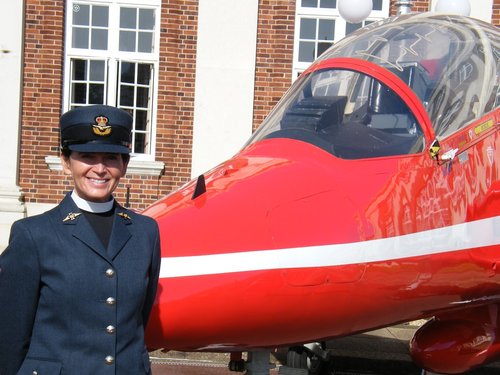
‘Excuse me! ‘What’ are you?’ I turned in response to the loud voice that boomed across the tarmac outside the Officers’ Mess at RAF Honington and walked towards him. ‘I’m a Padre’, I say. ‘But you’re a woman!’ ‘Oh, you noticed’, I respond with a smile on my lips. ‘You can’t be a Padre because you’re a woman and we don’t have any female Padres.’ ‘But we obviously do’, I say, pointing from my toes right up to the top of my head. Now admittedly we are a rare breed, for there are only four of us in the Royal Air Force, but I assure you I am a Padre’. ‘Well, I’ve been in the RAF Regiment for 34 years, and I’ve never seen a female Padre!’. ‘You, need to get out more’, I bat back with a cheeky grin, and we both laugh. The ice is broken, the banter ceases and we share in a proper conversation.
It is my first day at this RAF Station in Suffolk. It is the home of the RAF Regiment, the soldiers of the Air Force, and then, in 2011, a very male-dominated world indeed, with no women serving in the RAF Regiment. It is my second posting and I have been sent as the first female Padre to work with and alongside the RAF Regiment, a very ‘man-up’ world, as ‘an experiment’ to see if the service personnel will open up to a woman. Post Traumatic Stress is high, the impact of first Iraq and now Afghanistan theatres of war is taking its toll, and it is hoped that my presence will make a difference.
This is my first encounter with a member of the Regiment, and he is genuinely shocked and bewildered at my presence. He is a product of the structure, culture, and attitude of the RAF Regiment. They are tough, hard men, trained to kill, and to talk about their feelings is to show weakness, and so instead, when the things that they have seen and done mess with their heads they deal with it. Some drink too much, some get into fights, some gamble, some take drugs, some run away, some cheat on their wives, some go on one-night stands, and so on, for they do what they need to do, to take away the pain, even if only for a short while, but they do not talk about it.
But my experience, soon teaches me, that they do begin to talk to me, for everywhere I go across the Base, my advocate has been ahead of me telling everyone about the new ‘female’ Padre. It is not long, before there is a queue outside my office most days, and I am privileged to listen to men who are broken and hurting and desperately wanting and needing help to heal. The ministry is hard, and often exhausting, but hugely rewarding. Regularly I am called out in the middle of the night, often, ‘Padre Melanie’ is the only person that the Regiment Gunner who has been arrested will talk to. I work closely with the doctors and support staff, and I make many friends, with the first and my best support being the ‘old crusty’ (his words) Regiment guy who yelled at me on my first day. In so many ways this was not the place for a female ordained person, the language was often blue and swiftly followed with the phrase; ‘sorry Padre’. The posters on the crew room walls would often mean that someone would try to stand in front of them with the words; ‘sorry Padre’, and I would always respond, ‘it’s fine guys, I’ve heard and seen worse’, and watch them relax as they pick up a clean mug with the words, ‘you want a brew, Padre?’
My two years at RAF Honington were the most challenging and the most rewarding of my time serving in the RAF and I would not have missed it for the world, but it was made easier by my first encounter that turned from being hostile and challenging to laughter and friendship.
Ministers from daughter to mother by Revd Joanna Thornton
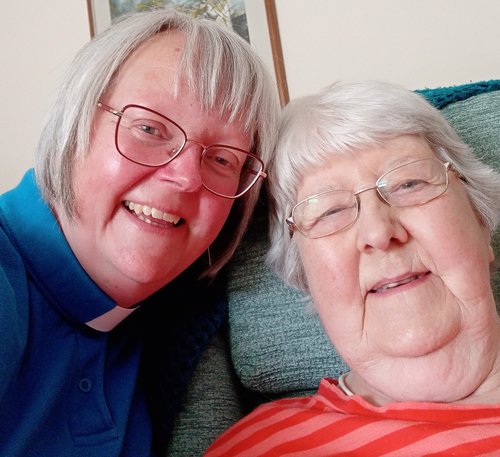
I am the Revd Joanna Thornton, the Superintendent minister of the Tamworth and Lichfield Circuit (Birmingham District), and here I am with my Mum, the Revd Joan Thornton, a supernumerary minister in my circuit.
In 1997, I was ordained at the London Conference, and then in 1999, Mum was ordained at the Southport Conference. I was privileged to be her assisting minister at the ordination! As far as we know, this was the first time that a daughter had assisted at her mother’s ordination!
Mum served for a number of years in what was then the Brunswick Central Circuit in the Newcastle District, working tirelessly at Long Benton, as the church cared for countless young people on the estate and shared God’s love with their neighbours. She then served in the Stanley Circuit before sitting down, first staying in Newcastle but in the past year moving to live near me and my daughters in the Midlands.
Meanwhile my ministry has taken me from East Anglia (the old Thetford Circuit), to three Circuits in London (Romford, Orpington and Purley) – and from there to my current appointment. Mum is now disabled and has a number of serious health issues, but enjoys worshipping with my Dad (who is a local preacher) at our chapel in the village of Alrewas whenever she can.
Between us we have many stories to tell – of opposition (“… of course we didn’t want a woman minister but actually you’re OK”), of frustration, of hard work that sometimes felt under-appreciated – but above all we tell the stories of the blessings we have experienced of being part of this wonderful, diverse community of people called Methodists.
On this 50th anniversary of the ordination of women we salute the trail blazers, we are thankful for all we have experienced through our ministries, and we treasure the opportunity and privilege of serving God as presbyters. Looking back to our two ordinations, we are both conscious that we really could not have done anything else other than to respond to Jesus’ call to follow along this path, and we thank God that the Methodist Church took this vital step in recognising and honouring the gifts and the calling of women!